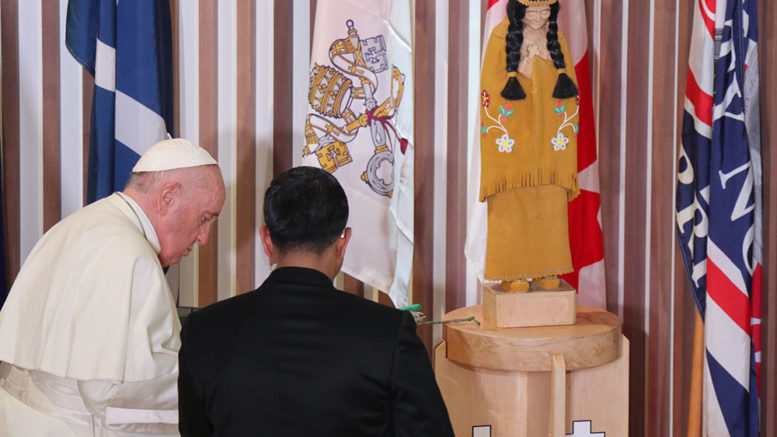By Jeremy Appel, Local Journalism Initiative Reporter
(ANNews) – A Vatican statement rejecting the Doctrine of Discovery, which was used to justify the conquest of Indigenous territories has been met with approval from Indigenous groups as a positive step towards reconciliation, although questions remain about what it means in practice.
The 15th-century doctrine was the culmination of a series of papal bulls, or declarations, based on the assumption that Indigenous lands were empty, which a March 30 statement from the Vatican now acknowledges “did not adequately reflect the equal dignity and rights of Indigenous peoples.”
However, the Vatican’s statement also deflects responsibility for the doctrine’s use, claiming the papal bulls “were manipulated for political purposes by competing colonial powers in order to justify immoral acts against Indigenous peoples.”
This comes a year after First Nations, Inuit and Metis leaders travelled to the Vatican, where Pope Francis apologized for the role of the Catholic Church in forcing Indigenous children into the forced assimilation institutions known as “residential schools.” This was followed by a Papal visit to Canada a few months later, where the Pope stopped in Alberta, Quebec and Nunavut.
During the Pope’s stop at the National Shrine of Sainte-Anne-de-Beaupré in Quebec, two Indigenous women unfurled a banner reading, “Rescind the Doctrine.”
Truth and Reconciliation Commission Call to Action #49 calls on all religious leaders to disavow all edicts used to justify European conquest of Indigenous lands, specifically naming the Doctrine of Discovery.
The Confederacy of Treaty 6 First Nations said in a statement to the Edmonton Journal that it’s unclear what the Vatican’s statement means in practice for Indigenous Peoples, who have “always known these lands have belonged to us since time immemorial.”
“As the moral conscience of Europe, the Vatican enabled Christian empires to commit genocide, starve, relocate and dispossess Indigenous peoples from these lands in the name of the Doctrine of Discovery,” the statement said. “It was used to justify the creation of what is now called Canada and its national, settler-colonial laws imposed on Indigenous peoples. Without this document, Canada has no historical mandate in their control of Indigenous peoples and territories.”
Lynne Proulx, the Quebec-based CEO of the Native Women’s Association of Canada, told the Journal that the Vatican’s statement raises questions about its legal implications.
“How are treaties impacted by this, and ownership of land now that we know that this doctrine — the whole basis of the land grab in Canada — was not justifiable?” she said, predicting “there’ll be a lot of analysis around it by legal experts, and even international experts.”
Assembly of First Nations National Chief Roseanne Archibald told The Canadian Press that the doctrine sent the message “that we were unworthy and that our lands were empty,” and that the Vatican should take another step and positively affirm the value of Indigenous peoples’ lives.
“We need the world to know that we are worthy, that we are valuable,” Archibald said.
Tsuut’ina Nation Chief Roy Whitney told the Calgary Herald that he’s pleased to see the Pope listened to Indigenous leaders’ concerns about the doctrine, which “was a major influence in often brutal and inhumane colonization.”
“We cannot rewrite the past, but the rejection of this doctrine demonstrates good faith, is a step toward reconciliation and demonstrates that when Pope Francis visited and met with Indigenous leaders in Canada, he listened.”
“Hallelujah,” was Union of British Columbia Indian Chiefs (UBCIC) Grand Chief Stewart Phillip’s immediate response to the news.
Phillip told CityNews the Vatican’s repudiation of the doctrine was a long overdue but “amazing step” towards reconciliation.
“The discrimination against people of color, Indigenous people, it’s time to throw that in a political dumpster of history,” he said.
The disavowal will serve to bolster Indigenous land and title claims in court, Phillip predicted, calling the Vatican’s move a “win for everybody.”
Matthew Wildcat, a University of Alberta political scientist from the Ermineskin Cree Nation, told CTV News that the Vatican’s statement represents a “humongous symbolic victory,” but questioned “what the actual effect will be.”
Lloyd Yellowbird of the Bent Arrow Traditional Healing Society in Edmonton also suggested the statement’s impact is up in the air.
“Maybe it’s a step, but we don’t know how that step is going to be looked at. Is it a big step? Is it a small step? Again, it’s about the action, not just the words,” Yellowbird told CTV.
Chief Tony Alexis of the Alexis Nakota Sioux Nation, who accompanied Pope Francis on his visit to Lac St. Anne last year, said the “pernicious and deeply harmful doctrine has cast a long, dark shadow over our people, perpetuating colonization, subjugation, and exploitation of Indigenous lands, lives, and cultures.”
“The cruel legacy of this doctrine persists. Governments and monarchies continue to wield it as a weapon, infringing upon our sovereignty, exploiting our resources, and denying us our rightful place as equal partners in shaping the future,” he said in a statement.



Be the first to comment on "Vatican rejects Doctrine of Discovery. Indigenous groups celebrate but say questions remain"